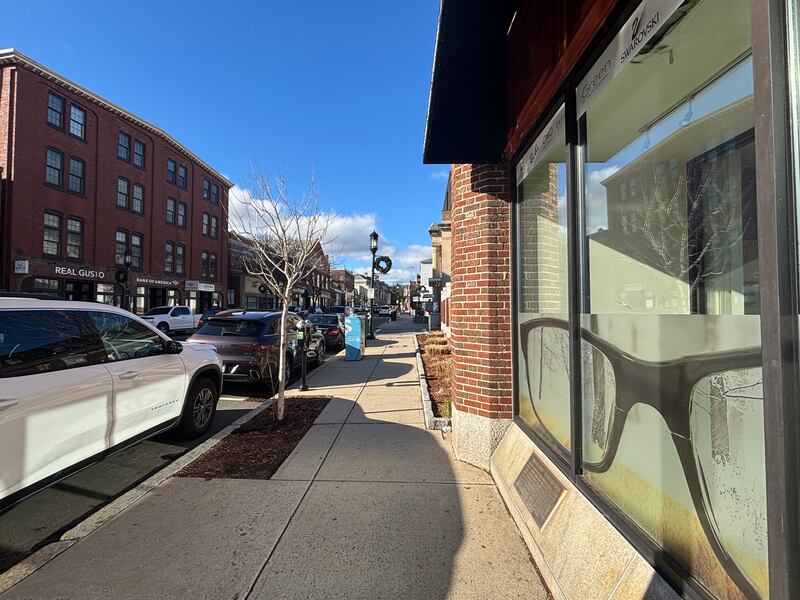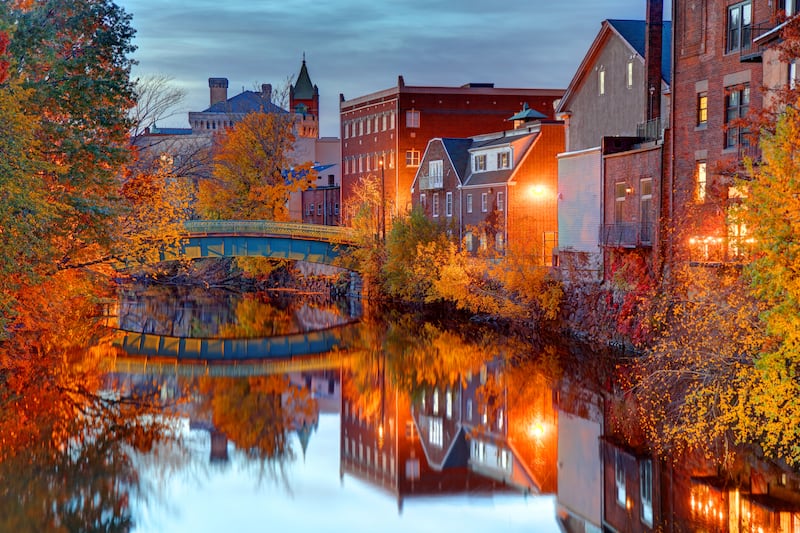MEDFORD, Massachusetts — Medford, a city just five miles outside of Boston, has a claim to fame that’s especially relevant during the holidays. The town is believed to be the birthplace of “Jingle Bells,” one of the most widely recognized Christmas songs.
I first learned this at my son’s Christmas concert when the music director introduced the beloved song. The following week, I ventured into downtown Medford to track down the history of “Jingle Bells.”
On a Friday morning before Christmas, Medford Square was bustling, streets clogged with traffic and residents hauling last-minute packages to the post office. As I walked down the street past restaurants, a bank and a real estate office, I spotted the first historic sign. This one pointed to where Revolutionary War Gen. Marquis de Lafayette dined at the home of the former Massachusetts governor in 1824 on his visit to the United States. I snapped a photo and continued my quest for the spot where Jingle Bells was reportedly composed: 19 High Street.
A bit further down the street, I found a bronze plaque affixed to the side of what’s now an optician’s office. “‘Jingle Bells’ Composed Here,” it announced.
According to the plaque, James Pierpont wrote the song in 1850 while in the Simpson Tavern, which once stood on the site and reportedly housed the only piano in town. The song, inspired by sleigh races held in Medford in the early 1800s, was later copyrighted in 1857 in Georgia.
The plaque also credits Mrs. Otis Waterman as a witness to the song’s creation, who allegedly verified the tavern as the composition’s birthplace.
But Pierpont eventually relocated to Savannah, Georgia — which also has a plaque saying that “Jingle Bells” was composed there. But the controversy over the song’s origin hasn’t gotten in the way of Medford claiming it for its own.

Was ‘Jingle Bells’ ever banned?
An organist and composer, Pierpont hailed from a notable family. His father, the Rev. John Pierpont, was a prominent abolitionist and Unitarian minister. His nephew was the legendary financier and banker John Pierpont (J.P.) Morgan. Despite his father’s dedication to progressive causes, young James followed a different path, ultimately rejecting his father’s ideals and leading a tumultuous life marked by financial struggles and a stint in the Confederate Army, in addition to the creation of one of America’s most enduring holiday songs.
Originally titled “One Horse Open Sleigh,” the song was reportedly composed for a Thanksgiving church program, according to historical accounts. But the tune’s catchy melody and playful lyrics quickly gained popularity, cementing its place as a Christmas classic.
Pierpont eventually settled in Savannah, Georgia, where he became the organist and music director at the Unitarian Church, where his brother served as the minister. It’s here that Medford’s claim to being the birthplace of “Jingle Bells” gets muddy. In 1985, Savannah erected a sign across the street from the church, asserting that Pierpont composed the song there.
“No one really knows where he was when he wrote it — that’s the rub,” Pierpont’s great-granddaughter Constance Turner told The Associated Press in 2003. “Evidently, James was quite the free spirit, and he published some bad songs and one, at least, we know of that’s a very good song.”
Medford’s claim faced further scrutiny in 2017, when Boston University theatre historian Kyna Hamill, who is also a Medford resident, challenged the long-held belief that Pierpont wrote “Jingle Bells” in Medford in 1850. Her deep dive into the history of the song concluded that Pierpont was likely living in California at the time, chasing the treasures during the Gold Rush.
She also discovered that “Jingle Bells” was first performed in Boston in 1857 during a minstrel show, a finding that highlighted the song’s complex history. In her 2017 paper, Hamill wrote that the song is a “prime example of a common misreading of much popular music from the nineteenth century in which its blackface and racist origins have been subtly and systematically removed from its history.”
After these findings were published, one school in Rochester, New York, opted not to use the song in performances anymore.
Yet others have pointed out that the song has helped transcend barriers. “With ‘Jingle Bells,’ it doesn’t matter how it was originally performed. What matters is that it transcends time and race and place. It’s a Christmas classic, we all love it — why take it away?” said Carol Swain, retired professor of political science and law at Vanderbilt University, in an interview on Fox.
Hamill also said that she hadn’t found other references to Mrs. Otis Waterman, besides the one on the plaque, according to Boston.com.

Community pride
Despite these revelations, Medford residents proudly embrace their “Jingle Bells” origin story. “I’d make T-shirts saying ‘Medford, home of ‘Jingle Bells,’” one local told me. The town, he noted, is home to another famous tune — “Over the River and Through the Wood,” derived from a poem written by Lydia Maria Child. The poem was inspired by Child’s memories of visiting her grandparents’ home in Medford, not far from where “Jingle Bells” is said to have been written.
Resident Barbara North recalled that the former site of the Simpson Tavern had a cafeteria and a pool hall on it when she was growing up. “It’s a big source of pride,” said North, who works at Andrew Realty Services, located right across the street from the “Jingle Bells” plaque. “There is such a rich history here.”
One group of Medford residents took their pride a step further. Nearly 25 years ago, a group of women started the Jingle Bells festival, a community event that celebrates the song’s history while raising funds for local causes.
Over the years, the festival has featured holiday tree displays, house tours and a record-breaking sing-along. “Every year, people kept coming and coming,” said Judy Lonergan, a local business owner who was among the women who started the festival.
In 2004, Lonergan got really ambitious and proposed to organize the largest “Carol Sing,” which would bring together in one area the largest group to sing carols, including “Jingle Bells.” The organizers reached out to the Guinness Book of World Records and were instructed to have every participant fill out a card to document the numbers. With an opera singer leading the crowd, nearly 3,800 participants joined voices to set the world record for singing Christmas songs.
Lonergan told me that until the festival started in 1999, the city never publicized its tie to the classic tune. “It wasn’t like it is now,” she said. And while debates about the true origins of “Jingle Bells” persist, Medford has embraced its place in holiday lore.


